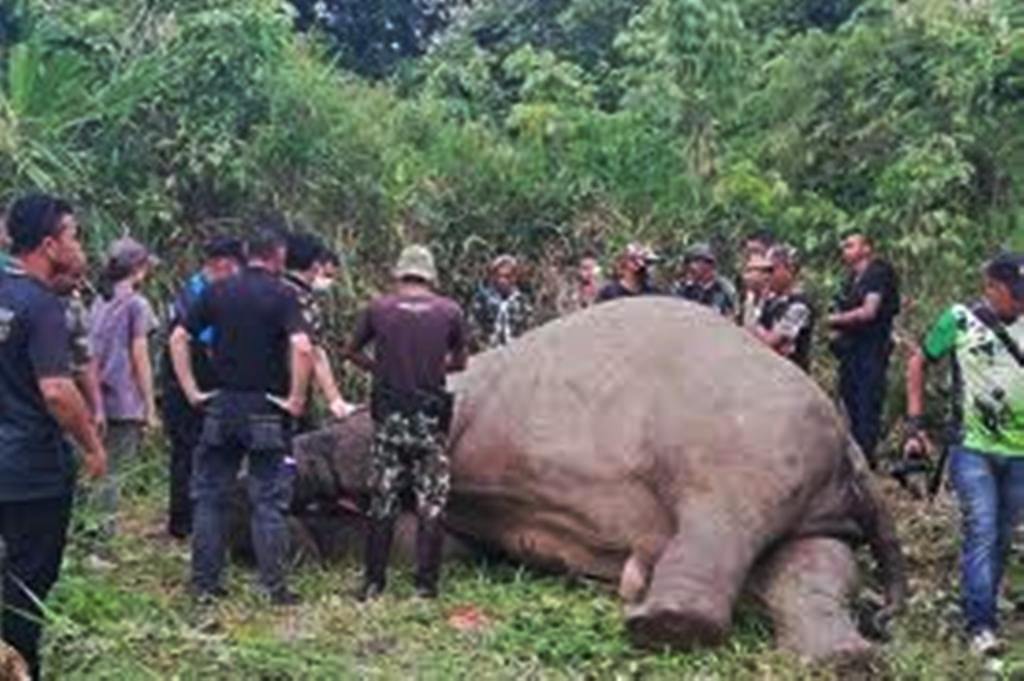Southern Thailand
Elephant Found Beheaded By Ivory Poachers in Thai National Park

The Department of National Parks have reported a male elephant was found beheaded in Sipo Waterfall National Park. Park officials in Narathiwat said the beheaded elephant was the work of ghastly work of ivory poachers.
On Sept 14, park officials were notified of the appalling incident by the Ban Chue Ko village headman. Upon hearing of the headless elephant they promptly went to investigate.
They found the carcass of the 15-year-old male elephant in a canal. Park officials had to drag the dead elephant back up on the bank before conducting an autopsy.
A forensic team said the elephant was killed at least two weeks ago. They found evidence that it was shot dead though no bullet from the ivory poachers were found at the scene.
The Department of National Parks, Wildlife and Plant Conservation said on its official Facebook page that the elephant’s head and tail were missing. Leading to the belief that the animal was killed for its tusks by ivory poachers.
Thailand to Take Zero-Tolerance Stance Against Animal Abuse
Meanwhile, Thailand’s Ministry of Foreign Affairs released an announcement of the country’s firm, zero-tolerance stance against animal abuse, cruelty or neglect. Amid allegations of increased animal abuse resulting from the accompanying economic downturn from the COVID-19 pandemic.
In March 2020, after Thailand’s government was forced to enact partial lockdown measures. Causing the tourism and services sectors business to dry up. The financial situation for many animal-related attractions became dire.
News emerged that captive elephants around the country were being held in inhumane conditions. With most facilities’ staff having been laid off, and the few that remained struggling to feed and care for the animals.
Soon afterward, animal-welfare controversies were fueled by video footage and reports that alleged the abuse of monkeys involved in Thailand’s coconut industry.
Thailand’s economic crisis was only compounded by the negative attention that accompanied these reports and subsequent campaigns to ban Thai products. Instead of improving the animals’ situations, local communities that are struggling to survive amid the pandemic are suffering due to these boycotts.
Food Shortages for Elephants in Captivity
The Thai government addressed the concerns in its statement, reporting that the Department of Livestock Development (DLD), through its network of provincial offices scattered throughout the country, was able to solve the food shortages for elephants that arose due to lack of tourism income.
“It was able to distribute over eight tons of fresh grass and over 25 tons of hay to elephant camps all over the country. Resolving the problem within weeks,” wrote the Ministry of Foreign Affairs. The government also said that it recruited animal welfare organizations to the cause. Above all with their help they temporarily relocated the elephants to locations that have adequate food supplies.
Thailand initially took a stand to protect animals in 2014 by introducing the Cruelty Prevention and Welfare of Animals Act. Also the DLD shortly thereafter. Within the DLD, the Division on Animal Welfare and Veterinary Service was also created. Official guidelines and regulations to enhance welfare standards for specific animal species were also established. Even more with a sub-regulation on elephant welfare management that reinforces the Five Freedoms and caters to the specific needs of elephants.
To raise awareness surrounding animal welfare and encourage public participation in stopping animal abuse, the DLD has established complaint channels. Above all so that any perceived mistreatment of animals can be reported directly to authorities. This can now also done through the ‘DLD 4.0’ mobile app.
Addressing the monkey abuse allegations, the government referred to its Wildlife Conservation and Protection Act of 2019. In which macaque monkeys are identified as a protected species. With official registration required for ownership. And, while it’s true that, in some areas; monkeys are used to help collect coconuts in small-scale harvesting. Especially in communities that depend upon coconuts for their livelihoods,
Monkeys have been picking coconuts for hundreds of years
In fact, NPR reported that these pig-tailed macaques have been raised and trained to pick coconuts for around 400 years in Thailand. Far from being ill-used, the Ministry of Foreign Affairs said, these monkeys are widely known to be treated as members of the family—happy, healthy, well-fed and cared for within the household during their non-working hours.
They are not trained through force or intimidation, but through repetition and reward. Resulting in a cooperative effort that benefits both man and monkey.
The Thai Food Processors’ Association (TFPA) affirmed that monkeys are not used at an industrial scale. Also export firms, which sell to suppliers and retailers, report that no monkey are involved in their supply chains. There’s also an auditing system; including random inspection of coconut plantations; in place the ensure the rules are adhered to.






























